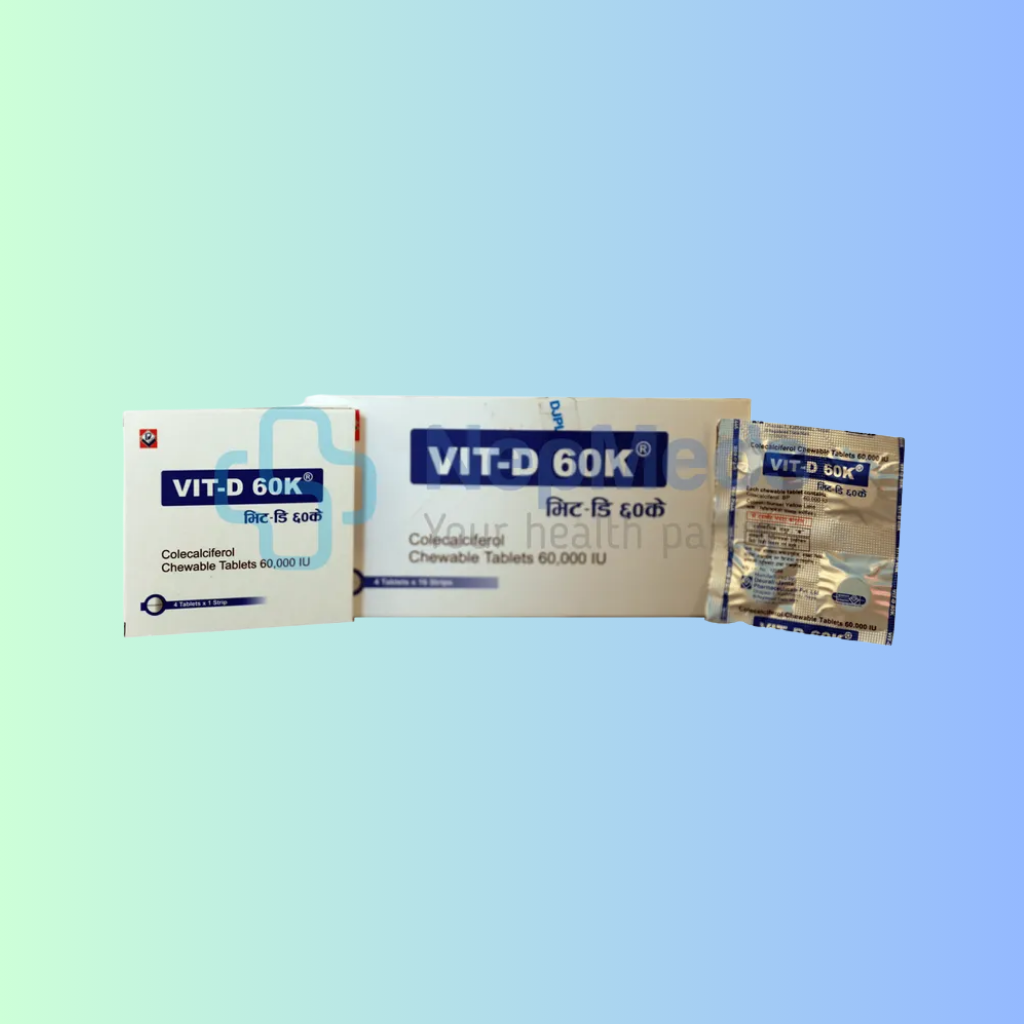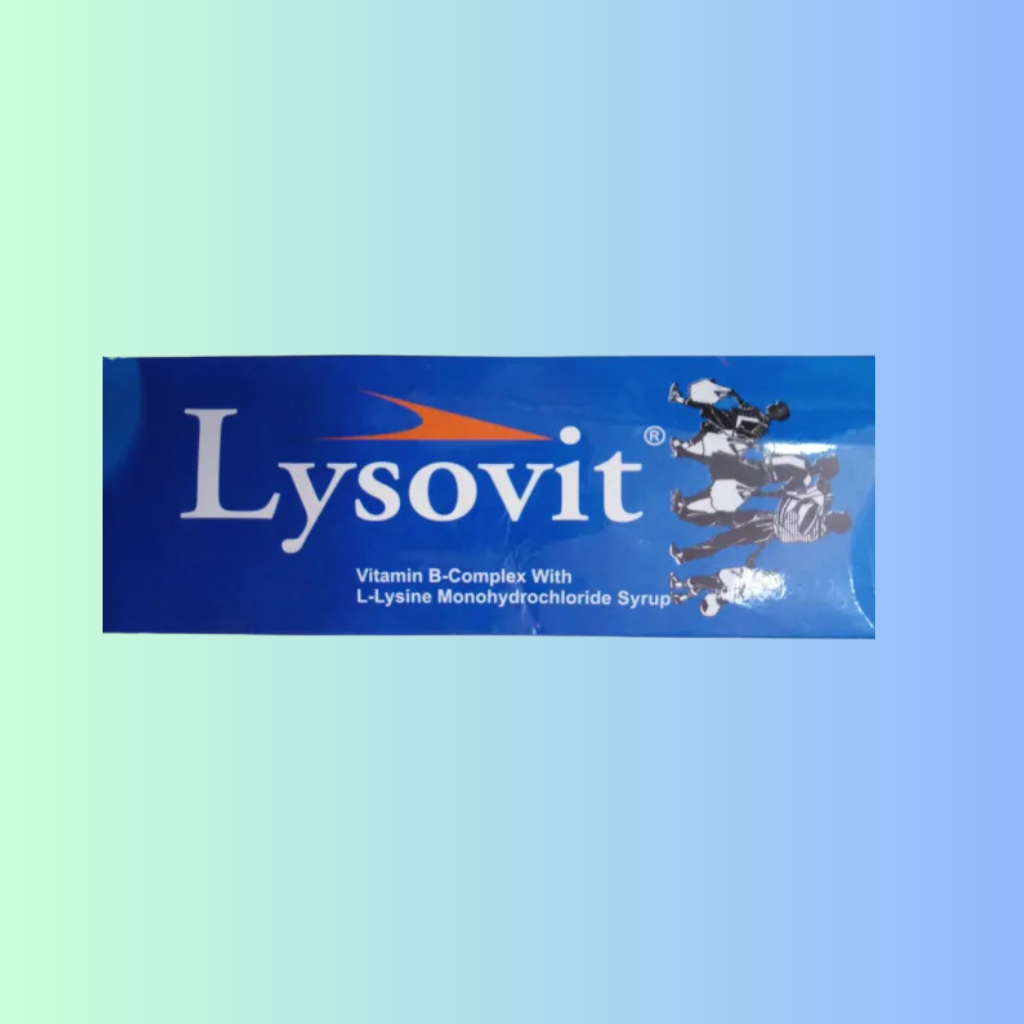VIT D 60K
VIT D 60K” refers to a Vitamin D supplement containing 60,000 International Units (IU) of Vitamin D, most commonly Cholecalciferol (Vitamin D3). This is considered a high-dose supplement and is typically prescribed to treat or prevent significant Vitamin D deficiency
₨200.00
Ask about productDescription
VIT D 60K” refers to a Vitamin D supplement containing 60,000 International Units (IU) of Vitamin D, most commonly Cholecalciferol (Vitamin D3). This is considered a high-dose supplement and is typically prescribed to treat or prevent significant Vitamin D deficiency.
Product Overview
Active Ingredient: Cholecalciferol (Vitamin D3) 60,000 IU. Formulation: It often comes in various forms like capsules, soft gel capsules, chewable tablets, or oral solutions/granules. The specific formulation might vary by brand.
What is Vitamin D3 (Cholecalciferol)? Vitamin D3 is a fat-soluble vitamin that your body naturally produces when exposed to sunlight. It’s also found in some foods and can be taken as a supplement. It plays a crucial role in:
- Calcium and Phosphorus Absorption: Vitamin D is essential for the intestines to absorb calcium and phosphorus from the diet. These minerals are vital for building and maintaining strong bones and teeth.
- Bone Health: By regulating calcium and phosphorus levels, Vitamin D helps prevent bone disorders like osteoporosis (weak, brittle bones), osteomalacia (softening of bones in adults), and rickets (softening of bones in children).
- Immune System Support: Vitamin D plays a role in modulating the immune system, helping the body fight off infections.
- Muscle Function: It contributes to normal muscle function.
- Overall Health: Research suggests Vitamin D may have roles in cardiovascular health, insulin regulation, and even mood regulation.
Why such a high dose (60,000 IU)? A 60,000 IU dose is generally considered a “loading dose” or a high therapeutic dose. It’s used to quickly raise Vitamin D levels in individuals with significant deficiency. While the daily requirement for Vitamin D is much lower (e.g., 600-800 IU for most adults), a severe deficiency requires higher doses to replete the body’s stores. These high doses are typically taken weekly or even bi-weekly, not daily, unless specifically directed by a doctor.
Key Uses:
- Treatment of Vitamin D Deficiency: This is the primary use, especially when a person’s diet, sunlight exposure, or malabsorption issues lead to insufficient Vitamin D levels.
- Osteoporosis: Often prescribed alongside calcium supplements and other medications for osteoporosis to improve bone density and reduce fracture risk.
- Osteomalacia and Rickets: To correct these bone-softening conditions caused by severe Vitamin D deficiency.
- Hypoparathyroidism: In some cases, to manage calcium levels in hypoparathyroidism.
Side Effects
While Vitamin D is essential, taking excessively high doses can lead to toxicity, as it’s a fat-soluble vitamin and can accumulate in the body. The main concern with high Vitamin D levels is hypercalcemia (abnormally high calcium levels in the blood), which can be dangerous.
Common Side Effects (usually mild and rare at prescribed doses):
- Nausea
- Vomiting
- Constipation or diarrhea
- Stomach upset
- Increased thirst
- Headache
Signs of Vitamin D Toxicity / Hypercalcemia (if you take too much):
- Gastrointestinal: Persistent nausea, vomiting, loss of appetite, abdominal pain, constipation.
- Kidney: Frequent urination, increased thirst (due to increased calcium excretion by kidneys), kidney stones, and in severe cases, kidney damage.
- Neurological: Weakness, fatigue, drowsiness, confusion, irritability.
- Musculoskeletal: Muscle weakness, bone pain.
- Cardiovascular: Irregular heartbeats (arrhythmia), high blood pressure.
- Other: Metallic taste in the mouth, weight loss.
If you experience any of these severe symptoms, particularly those related to hypercalcemia, seek immediate medical attention.
Precautions
Given that VIT D 60K is a high-dose supplement, it’s crucial to take it only under medical supervision and adhere to your doctor’s instructions.
- Prescription Only: This strength of Vitamin D is typically a prescription medication and should not be self-prescribed.
- Hypercalcemia/Hypervitaminosis D: Do not take this medication if you already have high calcium levels in your blood (hypercalcemia) or abnormally high Vitamin D levels (hypervitaminosis D).
- Kidney Disease/Kidney Stones: Use with extreme caution or avoid if you have kidney problems, a history of kidney stones, or a tendency to form them, as high calcium levels can worsen these conditions. Your doctor will likely monitor your calcium levels closely.
- Heart Disease: If you have heart conditions, especially arrhythmias or atherosclerosis, use with caution. High calcium levels can affect heart function.
- Malabsorption Syndromes: If you have conditions that impair nutrient absorption (e.g., Crohn’s disease, celiac disease, or have had bariatric surgery), your absorption of Vitamin D might be affected, and your doctor will adjust the dosage accordingly.
- Granulomatous Diseases: Conditions like sarcoidosis or tuberculosis can increase the risk of hypercalcemia when taking Vitamin D, requiring careful monitoring.
- Pregnancy and Breastfeeding: Vitamin D is essential during pregnancy and breastfeeding, but high doses (above 4000 IU/day) should only be used if clearly necessary and prescribed by a doctor, with careful monitoring to avoid harm to the baby.
- Drug Interactions: Inform your doctor about all other medications, supplements, and herbal products you are taking, as they can interact with Vitamin D:
- Antacids (containing calcium): Can increase the risk of hypercalcemia.
- Digoxin/Digitoxin (heart medications): High calcium levels due to Vitamin D can increase the risk of digoxin toxicity.
- Thiazide Diuretics (water pills): Can increase calcium levels.
- Anti-epileptic drugs (e.g., Carbamazepine, Phenytoin): Can increase Vitamin D metabolism, potentially reducing its effectiveness.
- Steroids (e.g., Prednisolone): Can reduce Vitamin D absorption.
- Weight-loss drugs (e.g., Orlistat) or Bile Acid Sequestrants (e.g., Cholestyramine): Can reduce Vitamin D absorption.
- Other Vitamin D supplements or multivitamins containing Vitamin D: Avoid taking these concurrently with 60K IU doses unless directed by your doctor to prevent overdose.
- Dietary Considerations: Your doctor might advise you to adjust your diet to include more calcium-rich foods or a calcium supplement, as Vitamin D works in conjunction with calcium for bone health.
- Monitoring: Regular blood tests (for Vitamin D and calcium levels) are often recommended, especially during the initial phase of high-dose Vitamin D therapy, to ensure levels are within a safe and therapeutic range.
- Alcohol: Limit alcohol consumption, as it can interfere with Vitamin D absorption and metabolism.
Prescription Information
- Dosage: The typical dosage for Vitamin D 60K is once a week for a specified period (e.g., 6-8 weeks) to correct a deficiency. The exact frequency and duration will be determined by your doctor based on your blood Vitamin D levels and overall health. It is generally not meant for daily use in this high dosage unless explicitly prescribed for very specific conditions.
- Administration:
- With Food: It is generally recommended to take Vitamin D supplements with a meal, especially one containing healthy fats (like avocado, nuts, or olive oil), as Vitamin D is fat-soluble and absorption is enhanced by fat.
- Consistency: Take it at the same time each week (if prescribed weekly) to maintain consistent levels.
- Form-specific instructions:
- Capsules/Soft Gels: Swallow whole with water.
- Chewable Tablets: Chew thoroughly before swallowing.
- Oral Solution/Granules: Follow specific instructions on how to prepare and take (e.g., mix with water or milk).
- Do Not Stop Abruptly: Do not discontinue the medication without consulting your doctor.
- Missed Dose: If you miss a dose, take it as soon as you remember. If it’s almost time for your next scheduled dose, skip the missed dose and continue with your regular schedule. Do not take a double dose to make up for a missed one.
- Storage: Store at room temperature, away from moisture, light, and heat. Keep out of reach of children.
Always follow your doctor’s instructions precisely for Vitamin D 60K, as improper use can lead to serious health issues.
Additional information
| form | Oral Tablets |
|---|








Reviews
There are no reviews yet.